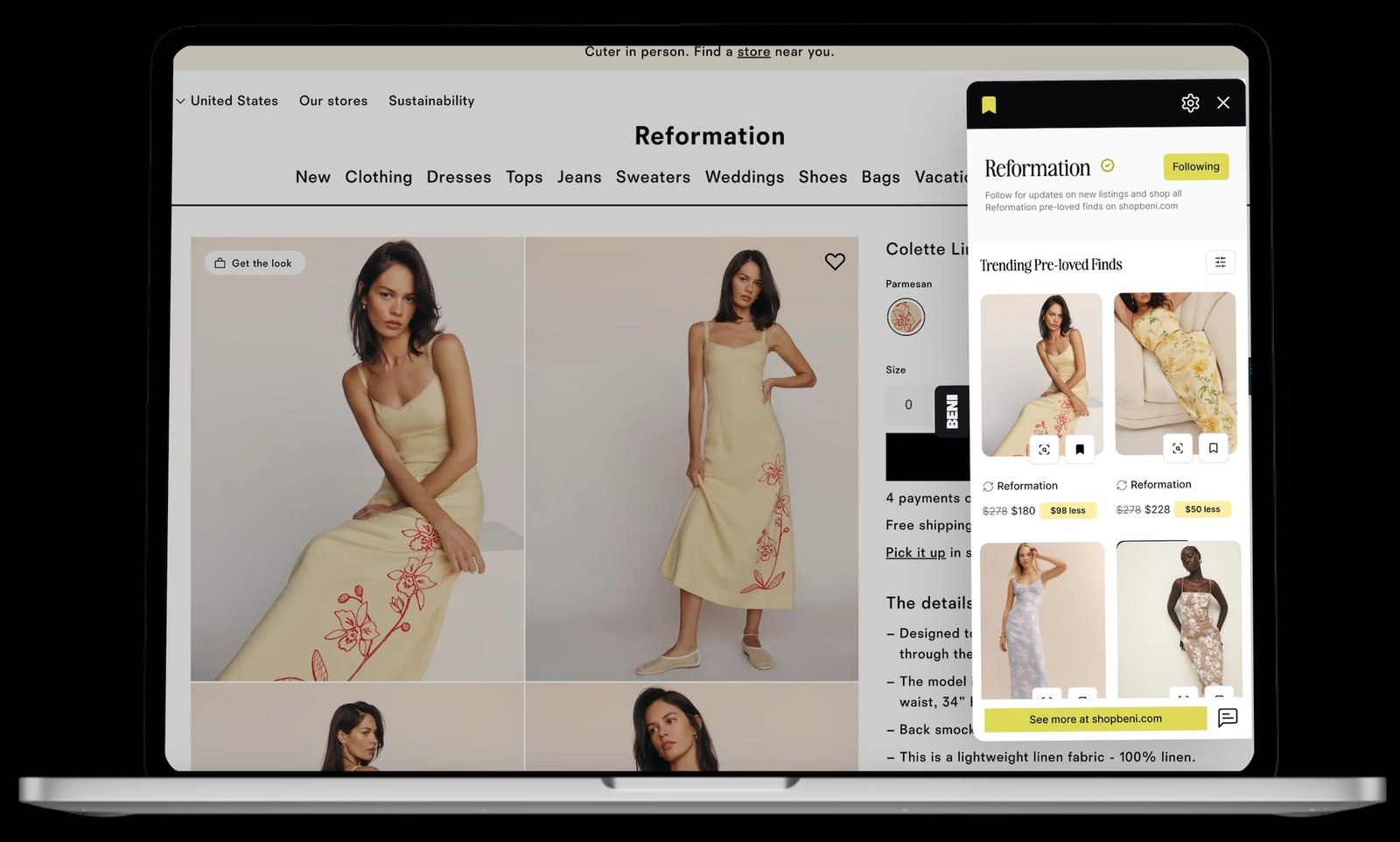Resale is no longer a niche; it’s the new normal. The fashion industry is experiencing a sustainability revolution, and at the forefront of this movement is Beni, a Santa Barbara-based startup that’s transforming how consumers approach secondhand shopping. This innovative platform has developed a sophisticated browser extension that seamlessly integrates sustainable shopping options into the traditional online retail experience, making it easier than ever for consumers to choose pre-loved items over new purchases.
Breaking Down Barriers to Sustainable Shopping
Beni addresses a critical challenge in the fashion industry: the gap between consumer intentions and actions when it comes to sustainable shopping. While 93% of shoppers express interest in secondhand items, many find the discovery process overwhelming and time-consuming.
Sarah Pinner, CEO, explained, “The inventory is online, but not always accessible,” revealing the core problem Beni aims to solve.
The platform’s approach is refreshingly simple yet technologically sophisticated. Rather than forcing consumers to learn new shopping habits, Beni meets them where they already shop, automatically surfacing secondhand alternatives for items they’re already considering. This strategy of “bringing resale to the shopper” rather than pulling shoppers into resale platforms represents a fundamental shift in how sustainable shopping technology operates.
Technology That Makes a Difference
At the heart of Beni’s growth is its AI-powered recommendation engine, which processes over 200 million resale listings from more than 40 partner marketplaces. The technology handles up to 20 queries per second, delivering personalized results that consider factors like style, brand, color, and material.
Sarah Pinner said, “Let’s say you’re looking at a Nike shoe. While on the Nike site, Beni pulls resale listings for that same shoe from over 40 marketplaces like Poshmark, eBay, or TheRealReal.”
The platform’s sophisticated AI capabilities go beyond simple product matching. Beni has trained its model to normalize sizing data across different platforms, addressing one of the most significant challenges in secondhand shopping. This technical innovation ensures that users receive relevant, accurate recommendations regardless of how different marketplaces categorize their inventory.
Impressive Growth and Market Impact
Since launching out of beta in September 2022, Beni has shown remarkable growth and market traction. The company secured $4 million in seed funding led by Buoyant Ventures, bringing its total funding to over $5 million. This investment has enabled the platform to expand significantly since its early days.
The platform’s partnership network has grown to include major resale marketplaces such as The RealReal, Rent the Runway, Vestiaire Collective, eBay, Poshmark, ThredUp, and Grailed, as well as brand-owned programs like Patagonia’s WornWear and Tree-powered sites including Girlfriend Collective, DÔEN, and CUTS. These partnerships provide Beni users with access to approximately 80% of all online resale listings, creating an unprecedented level of inventory aggregation.
Leadership Transition and Continued Innovation
In April 2024, the company experienced a significant leadership transition when co-founder Sarah Pinner stepped down as CEO due to personal health reasons.
Sarah Pinner shared, “I can live with the ‘what ifs’ of leaving this role, but I can’t live with choosing to continue down a path on which I can’t be the best, kindest version of myself.”
Fellow co-founder Kate Sanner stepped into the CEO role, bringing her extensive marketing and brand development experience to the position.
Kate Sanner stated, “When I think about what we’re building at Beni, it’s not just a product — it’s a movement. We are driving the re-commerce revolution forward, and I am fired up for what the future holds.”
Expanding Access and Removing Barriers
Under Sanner’s leadership, Beni has continued to innovate and expand access to its technology. The company launched checkbeni.com, a web-based platform that allows anyone to access Beni’s aggregated database without downloading the extension or app. This “un-gated experience” marks a significant step toward making sustainable shopping accessible to a broader audience.
The platform has also introduced new features like the Resale Registry, making it easier for users to share secondhand finds with friends and family. These innovations align with Beni’s mission to make resale as easy as buying new.
Economic and Environmental Impact
Beni’s impact extends beyond convenience to deliver real economic and environmental benefits. Users save an average of 55% compared to purchasing new items, while simultaneously reducing the environmental impact associated with fast fashion. The platform has successfully processed over 1 million daily listing updates, demonstrating its ability to handle massive scale while maintaining accuracy.
The company’s progress reflects broader market trends in the re-commerce sector, which is projected to reach $82 billion by 2026. By making secondhand shopping more accessible and convenient, Beni is positioned to capture significant market share in this rapidly growing industry.
Looking Forward
As Beni continues to expand its reach and refine its technology, the company stands as a compelling example of how innovative startups can address complex sustainability challenges through practical, user-friendly solutions. With its strong technical foundation, growing user base, and commitment to making sustainable shopping mainstream, Beni is well-positioned to play a significant role in the future of fashion retail.





